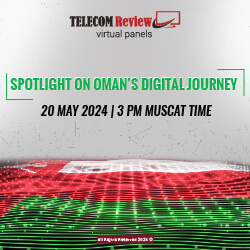By Fahad Al Hassawi, CEO at du
The telecommunications industry has embarked on a transformative journey towards achieving a greener future, where the combination of cutting-edge technology and a commitment to environmental stewardship are redefining the landscape. To tackle the environmental challenges that lie ahead, telcos must foster collaboration among diverse stakeholders. As of 2022, 50 global operators have pledged to reduce their carbon footprint over the next decade– up from 19 pledges in 2021 as outlined by GSMA in its 2022 "Mobile Net Zero" report.
Telcos can play a crucial role in driving environmental conservation efforts through innovative solutions and sustainable connections that redefine what it means to be a responsible corporate citizen. Through partnerships between businesses, governments, academia, and civil society; knowledge-sharing, technology transfers, and the implementation of sustainable practices become our new reality.
The Convergence of 5G, IoT, and AI
The marriage of 5G, Internet of Things (IoT), data analytics, and AI has unlocked a world of possibilities, propelling us towards achieving Sustainable Development Goals (SDGs). These transformative technologies hold the key to carbon reduction, sustainable energy, and efficient resource utilization. Each day, more than 2.5 quintillion bytes of data are generated, with more than 50% coming from IoT-enabled devices, offering unprecedented insights that can drive sustainable development and protect the environment. Embracing the potential of these technologies, du and its strategic partners, including Microsoft, IBM, Zaintech, and Picacity, are paving the way for innovative solutions in ESG and sustainability.
Picture a world where AI-enhanced sensors act as guardians of our environment. IoT devices, powered by AI algorithms, allow us to monitor water quality, identify pollution sources, and optimize waste management processes. IoT-enabled water quality monitoring systems can reduce the cost of water quality management by a staggering 40%, according to a study published in ScienceDirect. In fact, AI levers could reduce worldwide greenhouse gas (GHG) emissions by 4% in 2030, an amount equivalent to 2.4 Gt CO2e.
Through the deployment of 5G, IoT, and AI, du and its partners demonstrate the transformative power of technology in addressing pressing environmental challenges, driving tangible environmental protection objectives, and contributing to the UAE's Net Zero by 2050 strategic initiative. With a consulting-to-operate engagement model, du brings its expertise to UAE government entities and enterprises, fostering sustainable operations and energy management.
ESG Integration and Big Data Analytics for a Greener Business
Investment decisions are no longer solely driven by financial returns; they are increasingly influenced by environmental, social, and governance factors. This shift towards considering broader sustainability criteria is backed by research from UBS, which found that 90% of studies demonstrated either a positive or neutral relationship between ESG practices and financial performance. One example is the use of big data analytics to optimize network efficiency and reduce energy consumption. Telcos can analyze vast amounts of data collected from network operations to identify areas of high energy usage and optimize resource allocation, resulting in reduced carbon emissions and environmental impact.
Additionally, telcos are integrating ESG practices into their operations to promote sustainable development. For instance, they are taking measures to reduce electronic waste by implementing recycling programs for old devices and promoting sustainable design principles for new devices. Telcos are also focusing on reducing their own carbon footprint by adopting renewable energy sources and energy-efficient infrastructure.
Investors worldwide are recognizing the value of incorporating ESG criteria into their decision-making processes, ensuring that their investments align with environmental objectives and SDG targets. A remarkable 85% of individual investors, as revealed by Morgan Stanley's Institute for Sustainable Investing, harbour a keen interest in sustainable investing. This sentiment is echoed by a resounding 95% of millennials.
One example of ESG integration and big data analytics in the telecom sector is the use of data analytics to reduce carbon emissions. AT&T, for example, uses big data analytics to track energy and water usage in its buildings, allowing it to identify areas for improvement and prioritize energy-saving efforts. Another example is Vodafone's Internet of Things (IoT) technology, which uses sensors to collect data on various aspects of energy and resource usage. By harnessing the power of big data analytics, telcos can uncover hidden patterns, optimize resource usage, and make informed decisions aligned with SDGs. Delving into the vast realms of data will allow telcos to foster energy efficiency, reduce waste, and drive sustainable business strategies that pave the way for a greener future.
The data speaks volumes about the power of telecommunications and technology partnerships, illustrating that sustainable connections can be the driving force behind a better world for all. We stand at the forefront of this tectonic shift as it leverages the potential collaboration to forge a greener, more sustainable future.
Empowering the UAE Community with Innovation
As the trusted partner of UNICEF, with a focus on cyber-safety awareness in the UAE, du has conducted a series of impactful initiatives. Through SMS and social media channels, the company launched a successful awareness campaign focusing on child safety on the internet and the significance of Safer Internet Day.
In addition, various initiatives were introduced to ensure a safer internet experience for individuals of all ages. The company collaborated with organizations such as INJAZ UAE and EdComs Middle East to deliver online safety education programs for senior citizens as well as school-focused digital wellbeing sessions. The objective was to promote responsible internet usage and enhance consumer awareness regarding potential risks within the UAE community. With a strong commitment to digital wellbeing, du continues to work towards creating a safer online environment and empowering individuals with the necessary knowledge to navigate the digital world securely.
In 2022, the company unveiled a remarkable innovation aimed at empowering charitable giving. The introduction of a charity feature in the du app revolutionized the way customers could donate to registered charities in the UAE. The user-friendly interface streamlined the donation process, enabling customers to make contributions effortlessly, free of cost.
Additionally, the company extended its support to charitable organizations by providing free SMS campaigns to its extensive customer database. This strategic initiative significantly reduced fundraising costs for multiple organizations, enabling them to direct more resources towards their impactful programs and initiatives.
du's dedication to driving positive social impact was further exemplified by the successful completion of 33 SMS broadcast campaigns throughout the year. These campaigns reached a vast customer base of over three million individuals, amplifying the charities' messages and raising awareness for their causes. The cost savings achieved through utilizing SMS campaigns as opposed to traditional advertising methods were substantial, fostering a positive and meaningful impact within the charitable community.
Through innovative features and impactful communication strategies, du continues to empower the UAE community to make a difference through charitable giving, strengthening the bond between customers and the causes they care about.
Energy-Efficiency and Environmental Initiatives Lead the Way
In a concerted effort to reduce its environmental footprint, du has implemented a range of energy-efficient practices and environmental initiatives. From hybrid generators and solar panels to free cooling systems and sustainable headquarter designs, the company is committed to creating a greener future. By embracing green technology and promoting sustainable practices, du has achieved significant reductions in carbon emissions and energy consumption.
The implementation of energy-efficient hybrid generators in 170 generator-run BTS sites has led to a remarkable 50% reduction in diesel consumption. This equates to a substantial carbon footprint reduction of 5,800 tCO2 during the year. Buoyed by this success, du plans to install an additional 100 hybrid generators in 2023. Moreover, 78 sites now operate solely on solar panels, resulting in a reduction of 360 tCO2 during the year. Not only has this switch to solar power saved approximately 1.4 million liters of diesel annually, but it has also led to a significant carbon footprint reduction of 3,714 tCO2. As part of their ongoing commitment to renewable energy, du aims to install 100 more solar-powered sites in the coming year.
Incorporating free cooling systems in mobile sites has proven to be a game-changer, reducing energy consumption by approximately 7,000 MWh per year. Furthermore, this translates into a substantial carbon footprint reduction of approximately 3,500 tCO2. By leveraging cooler outside air during winter, du has not only lightened the burden on air-conditioning, but also achieved energy savings of 15-16% per site.
In a bid to enhance energy efficiency, du has consolidated eight data centers into two geo-redundant data centers. This consolidation has not only reduced overall energy consumption but has also increased resiliency. Additionally, measures such as raising the white space temperature to 26ºC and deploying LED and solar-powered streetlights further contribute to energy efficiency.
At its sustainable headquarters, du has seamlessly blended innovation, quality, and sustainability. By adhering to the highest standards, the new building significantly reduces energy consumption, setting a benchmark for sustainable designs. Additionally, the decision to replace mercury vapor lamps with energy-efficient LED lights in its warehouse has resulted in substantial energy savings of 419,555 kWh and reduced energy costs.
Promoting awareness of energy efficiency has been a priority for du, even during non-operational hours at its call center. By instilling a sense of responsibility, the company has achieved energy savings of 113,067 kWh and reduced energy expenses. Overall, through the implementation of various energy-saving initiatives across different sites, du has achieved a remarkable 30% (AED 1,137,638) reduction in energy costs.
Reducing Greenhouse Gas Emissions and Embracing Sustainability
In a concerted effort to reduce greenhouse gas emissions, du has embarked on several initiatives to improve energy efficiency. By replacing diesel-powered generators with hybrid and solar-powered alternatives, the company has taken significant steps towards reducing its carbon footprint. In 2022 alone, the installation of 50 additional hybrid generators brought the total number to 170, resulting in a noteworthy reduction in diesel consumption and subsequent carbon emissions. Furthermore, the company increased its solar-powered sites by 18 and plans to add 100 more to further contribute to its commitment to green energy.
Based on its commitment to sustainability, du has introduced biodegradable SIM cards across all points of sale. By utilizing oxo-biodegradable plastic, these SIM cards break down and degrade, significantly reducing their environmental impact. To minimize plastic waste, the company has distributed reusable water bottles to employees and eliminated plastic water bottles from vending machines and catering partners. In addition, the phasing out of plastic bags in retail stores in favour of 100% paper and biodegradable bags has made a substantial difference in reducing waste.
With a comprehensive waste management strategy, du is actively reducing waste generation, promoting recycling, and diverting waste from landfills. By adopting these sustainable practices, the company sent 108.72 tonnes of general waste to landfill from its warehouse and command center in 2022. Through its unwavering commitment to sustainability and energy efficiency, du is leading the charge towards a healthier, more environmentally conscious future.
By seamlessly blending cutting-edge innovations and strategic collaborations, telcos can develop transformative solutions that advance environmental protection objectives and enable individuals, homes, and businesses to embrace sustainable practices.










